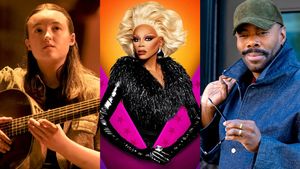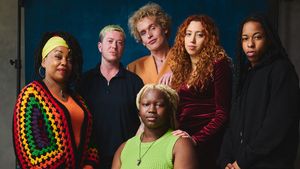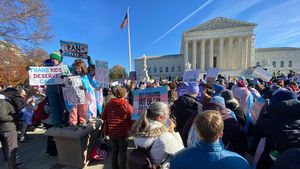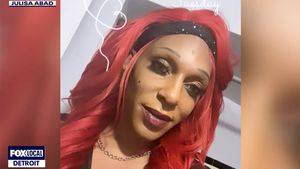Treatment GuideJust DiagnosedSex & DatingAfrican AmericanStigmaAsk the HIV DocPrEP En EspañolNewsVoicesPrint IssueVideoOut 100
CONTACTCAREER OPPORTUNITIESADVERTISE WITH USPRIVACY POLICYPRIVACY PREFERENCESTERMS OF USELEGAL NOTICE
© 2025 Pride Publishing Inc.
All Rights reserved
All Rights reserved
Scroll To Top
By continuing to use our site, you agree to our Privacy Policy and Terms of Use.
Danny Gray knows exactly when he was infected with HIV. How could he forget September 9, 1999'9/9/99? Furthermore, the occasion was in the middle of a rare and dramatic lightning storm in San Francisco. This particular alignment of the elements set a precedent not only for the exceptional severity of Gray's experience with HIV but also for the enlightenment he has found in his ongoing spiritual quest for healing. In the fall of 1999, Gray was a 32-year-old recent law school graduate'nothing short of a hotshot former editor of the law review at the University of California's Hastings College of the Law. He had secured a prestigious yearlong clerkship in San Francisco to be followed by a job at a top Silicon Valley firm. In the first week of his clerkship he fell terribly ill. With a fever of 104 degrees, he had all the hallmarks of acute HIV infection: aches, shivers, vomiting, diarrhea. He was jaundiced to boot, with yellowed skin and eyes. It didn't take long for his physicians to confirm he was in the primary infection phase. They knew this with certainty because he was enrolled in a study for HIV-negative men at the time and had had his viral load taken only three weeks earlier. He went from zero to what he calls 'my celebrity viral load of 2.6 million'--so high that his doctor needed to send the blood sample to an East Coast lab to be analyzed, since Bay Area labs couldn't precisely measure loads above 1 million. His hair also fell out in clumps. A doctor told him he was so sick that he could be one of the rare cases of HIVers who do not recover from seroconversion illness. In some ways, though, the experience proved to be lifesaving for Gray. Beneath the apparent success of his life, he was deeply troubled and in need of a ground shift. Shortly after learning he had AIDS, he was hospitalized for suicidal depression; he had already been hospitalized twice for depression--the first time when he was only 15. He had started drinking at 19 and says he never knew moderation. Although he'd been a daily drinker during his 20s, he adds, he was able to quit while he was in law school with the help of a 12-step recovery program. Then, facing death while lying in a hospital bed, he had an awakening. 'I felt like the worst thing that could possibly happen has happened, and it's perfect,' he says, his voice airy and soft, very much that of the yoga teacher he has since become. 'When everything that your ego is based on collapses--your looks, your career, your abilities, your health, whatever it is,' he explains, 'the ego collapses. Occasionally that is a door that opens into a spiritual opportunity. I discovered that there was a much deeper Danny that was not at all threatened by this illness. It was deeper than what I looked like. It was deeper than what I did for a living. It was deeper than my health, than my dating, than my relationships. There was this perfect, healthy, beautiful, unchanging, eternal self that I'd never experienced before.' He pauses for a moment and reflects: 'It has taken seven years to find the vocabulary to describe this experience.' Making good on his realization has taken nearly as long. After he had to wrenchingly accept that he was too sick to maintain his clerkship, he was again hospitalized for depression. He also lost his commitment to sobriety. For several years he drifted. He worked at the Silicon Valley firm for a while but worried that the long hours would jeopardize his slowly returning health. 'I had this really shallow existence,' he recalls. 'It was all work. I would eat dinner at my desk. I went in on weekends.' After resigning from the firm, he found himself an unemployed alcoholic who had to live at his mother's house in Davis, Calif. 'I was really lost,' Gray says. Slowly, though, things began to look up. He landed a 9-to-5 job in labor relations at the University of California, Davis, that eventually led him to a similar position in human resources at the University of California, Los Angeles, where he works today. The pay is a fraction of what he could make at a law firm--but, he says, so is the stress. Then in 2001 he found yoga. 'Discovering yoga was physically transformative and later became spiritually transformative,' he says. 'My body just loved what yoga was. My health improved, my strength improved--everything. I slept better. My digestion improved. All the little physical annoyances of life got better. But I was still drinking. So Danny the drunk was also a yogi. I was a drunk yogi. But the pieces were beginning to fall into place.' He found himself going back to his recovery program. This time, though, he decided to take the spiritual aspect of the program seriously. Raised in an agnostic household, he had previously had reservations about submitting his will to a higher power, as the 12-step program mandates. But he was able to find a synergistic source of spiritual inspiration in a relatively new style of yoga at the time known as Anusara, which roughly translates to 'flowing with grace,' 'going with the flow,' or 'following your heart,' strongly emphasizing the spiritual aspect of the practice. Sober for three years now, Gray describes himself as 'robustly healthy.' He has had an undetectable viral load for the four years since he settled on his latest triple cocktail, and his CD4 count ranges between 900 and 1,200. After half a lifetime of juggling antidepressants, he says, he was recently able to go off them, adding that 'miracles happen.' He owes his health, he says, to the positive attitude he's been able to discover through his yoga-centered spirituality. He practices up to three hours a day and coteaches a class (followed by a 12-step meeting) twice a week to recovering alcoholics. He hopes to design a class specifically for HIVers as well. To keep his healthy focus, he says, he divorced himself from the personal mantra that had plagued him since adolescence: 'I hate my life.' He says, 'I took that tape out, and I put a new tape in. And the new tape is: 'I love my life.' ' He repeats this phrase to himself, he adds, throughout each day. 'We create our own reality,' he explains. 'If we focus on the good, the good is what we get. What I've discovered in the past year is that it really does change your reality.' When asked if he would choose to have HIV enter his life if he could go back in time, he hesitates. 'The only way that I would choose not to have HIV is if there were some way to have the gifts that HIV has given me but not the HIV,' he says. 'And it's hard to imagine that.' YOU SHOULD KNOW! Anusara Yoga, a form of hatha yoga, has spread quickly since its creation in 1997 across the United States as well as Europe, Australia, Canada, Japan, and Mexico. Founder John Friend has attributed the rapid growth in popularity to the 'practice's uplifting philosophy, epitomized by a 'celebration of the heart,' that looks for the good in all people and all things.' Find regional workshops, retreats, trainings, and instructors as well as other background on its practice and philosophy at Anusara.com.
From our Sponsors
Most Popular
Lexi Love comes out as HIV+ after Trump deletes federal resources
January 23 2025 11:23 AM
Grindr is reminding us why jockstraps are so sexy and iconic
May 02 2025 5:36 PM
BREAKING NEWS: Trump admin moves to end federal HIV prevention programs
March 18 2025 6:10 PM
Trump's orders prompt CDC to erase HIV resources
January 31 2025 5:29 PM
Celebrating Black History Month with our annual African American issue
February 01 2025 3:28 PM
Tyler TerMeer vows to continue to fight for health care for all
January 28 2025 3:00 PM
Discover the power of Wellness in your life
March 26 2025 12:41 PM
Plus: Featured Video
Latest Stories
Dancer. Healer. Survivor. DéShaun Armbrister is all of the above
July 02 2025 8:23 PM
Two right-wing Supreme Court justices signal they may uphold access to PrEP and more
April 21 2025 4:10 PM
Broadway's best raise over $1 million for LGBTQ+ and HIV causes
April 03 2025 7:15 PM
Plus nominated for 2025 GLAAD Media Award
January 22 2025 12:42 PM
'RuPaul's Drag Race' star Trinity K Bonet quietly comes out trans
December 15 2024 6:27 PM
AIDS Memorial Quilt displayed at White House for the first time
December 02 2024 1:21 PM
BREAKING: Supreme Court rules to save free access to preventive care, including PrEP
June 27 2025 10:32 AM
1985: the year the AIDS crisis finally broke through the silence
June 26 2025 11:24 AM
Trump admin guts $258 million in funding for HIV vaccine research
June 03 2025 3:47 PM
500,000 Children at Risk: PEPFAR Funding Crisis
April 08 2025 3:51 PM
The Talk Season 5 premieres this spring with HIV guidance for the newly diagnosed
March 26 2025 1:00 PM
Jess King is here to help you live your happiest, healthiest life yet
March 24 2025 4:35 PM
A camp for HIV-positive kids is for sale. Here's why its founder is celebrating
January 02 2025 12:21 PM
VIDEO: A man living with HIV discusses his journey to fatherhood
June 10 2025 4:58 PM
HRC holds 'die-in' to protest Trump health care cuts
April 28 2025 2:11 PM
Season 4 of The Switch on resilience & radical self-love returns this spring
March 26 2025 12:20 PM
Gerald Garth is keeping people of color happy and healthy through trying times
March 11 2025 3:38 PM
This long-term HIV survivor says testosterone therapy helped save his life.
December 16 2024 8:00 PM
Ricky Martin delivers showstopping performance for 2024 World AIDS Day
December 05 2024 12:08 PM













































































